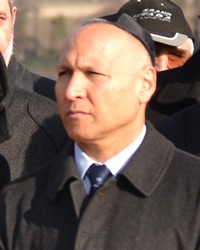At the end of the 15th century, Spain and Portugal expelled their Jewish populations. Some of these Jews settled into the Ottoman Empire. The Sultan of the Ottoman Empire admired Jews for their business and language skills. Serbia attained its independence from the Ottomans in 1830. Before that date, the Austro-Hungarian Hapsburg Empire gained control of Bosnia-Herzegovina in 1878.
Between WWI and WWII, the number of Jews in Yugoslavia was over 80,000. Tragically, over four-fifths of the Jews perished in WWII because of the Nazi genocidal policies.
Since the fall of the Iron Curtain in 1990-1991, the number of Jews in Bosnia-Herzegovina is declining every year. Serbian-speaking Jews are immigrating, mostly to Israel or the USA. The violence and atrocities of the Yugoslav wars in 1991-2001 further decreased Jewish numbers in Bosnia.
The primary language of the remaining Jews in Bosnia-Herzegovina is Serbian. Many also speak either Ladino or Yiddish. Since many Jews are university educated, they also speak English. There are currently few or no followers of Jesus among the Serbian-speaking Jews. A completely updated Bible and the JESUS Film are available in the Serbian language.
Most Jews in Bosnia-Herzegovina live in or near the capital city of Sarajevo. Jews work in universities, medicine, law, politics, entertainment and journalism. Some own and operate businesses. Their ability to speak multiple languages allows them to engage in international business ventures. Jewish parents encourage their sons and daughters to get university educations. Sometimes children go to private Jewish schools to learn their faith, culture and the Hebrew language. Anti-Semitism is growing in Bosnia-Herzegovina. Jews try not to display their status and identity due to fear of terrorism by the far right or jihadists. For the most part, Jews get along well with their non-Jewish neighbors.
Most Jews, even secular ones, often celebrate the Jewish holidays among themselves as a remembrance of their heritage. Jews are especially devoted to their families.
The Jews on the European continent have been a significant influence in its history and culture. Persecution of and discrimination against Jews have been the historical reasons for their migrations and settlements around the world.
For religious Jews, God is the Supreme Being, the Creator of the universe, and the ultimate Judge of human affairs. Jews believe God revealed Himself to Moses in the Torah, the first five books of the Old Testament. Beyond this, the religious beliefs of the Jewish communities vary. Serbian-speaking Jews are diverse.
Each Jewish denomination, Orthodox, Conservative or Reformed, maintains synagogues and celebrates the traditional Jewish holiday calendar. While most Serbian-speaking Jews are religiously affiliated, there is a significant minority, which is secular. Many Jewish people in Eastern European countries keep cultural Judaism, but they have rejected the spiritual elements taught in the Old Testament. They might take part in cultural events and even religious ceremonies, but they are secular or New Age in their spiritual lives.
The Jews have a wonderful understanding of their connection with the Abrahamic covenant. However, they also have a history of rejecting Jesus Christ as Messiah. Serbian-speaking Jews need to see the love of the Savior demonstrated to them in practical ways. Jews often blame Christians for the Holocaust.
Ask the Lord of the harvest to send forth loving his servants to work among the Jewish community in Bosnia-Herzegovina.
Ask the Holy Spirit to grant wisdom and favor to the mission agencies that are focusing on the Jews in Eastern Europe.
Pray that the Jews of Bosnia-Herzegovina will understand that Jesus is their long-awaited Messiah.
Pray for a church planting movement among each Jewish community in Sarajevo.
Scripture Prayers for the Jewish, Serbian-speaking in Bosnia-Herzegovina.
| Profile Source: Joshua Project |










